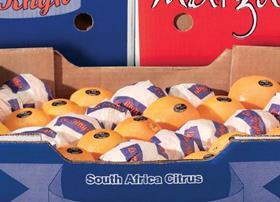
South Africa’s citrus producers, supported by the country’s Citrus Growers Association (CGA), have recommended that the South African Department of Agriculture, Forestry and Fisheries (DAFF) issue no phytosanitary certificates for the shipment of citrus to Spain during 2015.
The decision was taken at last week’s conference of citrus growers, which was held in the northern citrus regions of South Africa, and was confirmed by the industry’s special envoy in dealing with South African – EU issues, Deon Joubert.
Sources say that shipping to Spain would represent unreasonable risks for the industry. The South Africans say that the processes and procedures applied upon entry into Spain are simply too risky, potentially endangering supplies to the rest of Europe which represents around 85 per cent of the country’s citrus shipments.
The Board of the CGA has confirmed its support for the recommendation in its news briefing to growers: “It is in the best interests of South African citrus growers to request DAFF to stop issuing phytosanitary certification for shipments to Spain. This is not an easy decision as South Africa would like to supply all customers with the fruit they desire, but in the interests of securing the market and meeting the EU’s demand of reducing interceptions it is the right decision.
“The methodology and ability of Spanish officials to correctly identify viable citrus black spot (CBS) is unknown – clearly a big concern for South African exporters,” the group added.
Action by the South Africans in terms of shipments into southern Europe has been expected for some time. While the latest decision only affects Spain, it is also an indication that the latest rounds of negotiations did not yield the results that the South Africans had hoped for. The statements do not mention any of the other southern Mediterranean countries where there had also been concern concerning CBS processes.
South African sources say that the Spanish authorities simply do not give enough credit to the comprehensive steps that the industry has been taking to minimise the risk that CBS is posing to European producers. These measures have already cost the South African business an estimated R1bn and have generally been accepted as sufficient to just about eliminate any risk of the disease being transferred to European orchards.
The South Africans say that they have previously been offered access to all European facilities where the testing of samples for CBS is carried out. Prior to the latest round of discussions they had hoped to resolve the outstanding issues regarding interceptions from last season. This, they said, was vital in order to have confidence in the mythology and process with regards to CBS inspection and reporting on EU borders.
The South Africans have indicated that they are comfortable complying with the processes and procedures applied in northern European countries. They also have confidence in the European institutions in those countries dealing with CBS procedures.
Clearly, the industry did not get the answers or commitments required from the Spanish, hence the dramatic decision to ask the government not to issue phytosanitary certificates and documents for potential shipments. Without this it will be impossible for any South African grower to ship directly to Spain.
Just what the impact will be on Spanish importers and retailers is yet to be seen.
The ongoing dispute between South Africa and the EU regarding CBS is presenting problems for the South African industry in terms of planning its 2015 season. While there is generally more appreciation of the South African views in the northern European countries, it seems that in the south things are far from settled.
The dispute between South Africa and the EU may almost inevitably end up at the World Trade Organisation (WTO). South Africa’s Trade and Industry Minister Rob Davies stated in October last year that South Africa will have no choice but to take the CBS matter to the WTO.
The new South African citrus season is starting this month with shipments of satsumas and lemons, and is destined to carry on until November.



